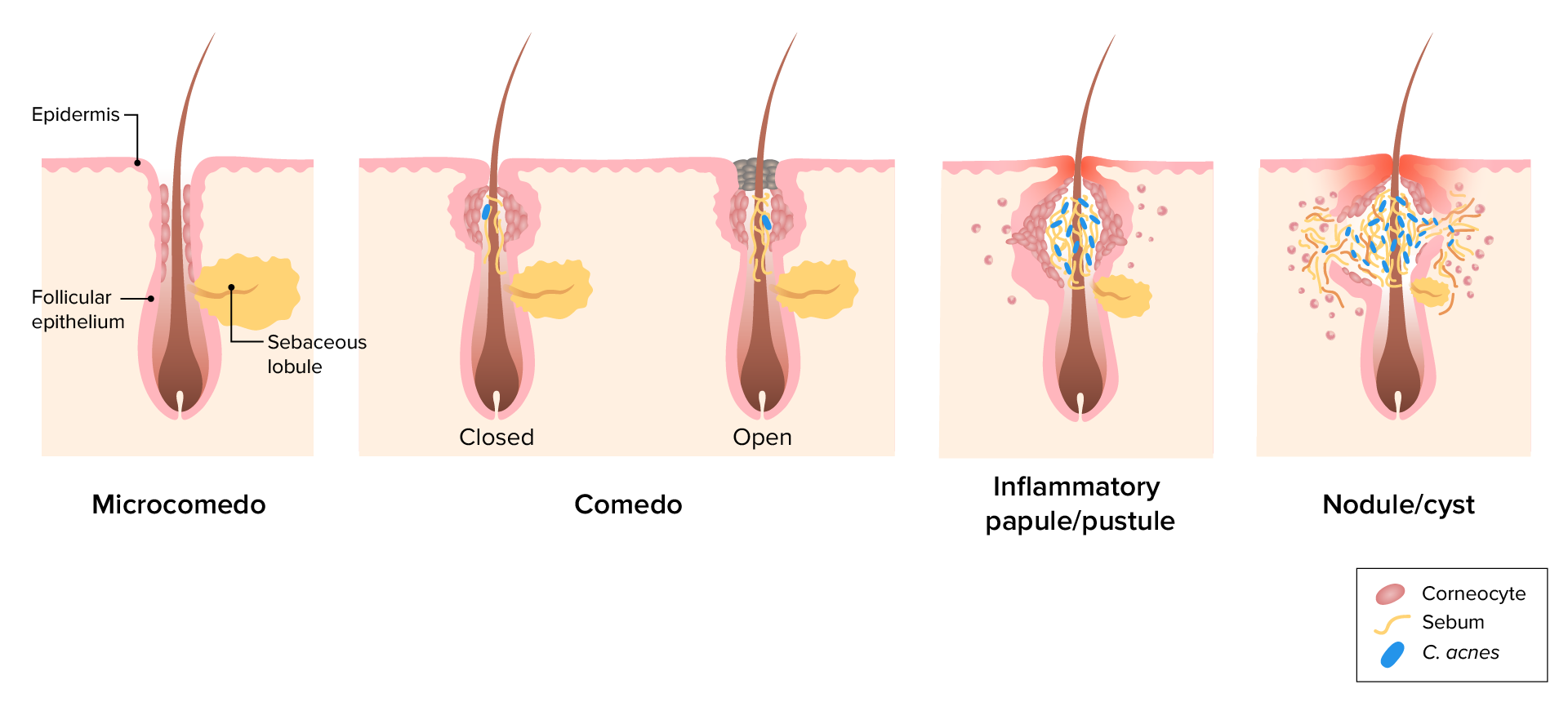Playlist
Show Playlist
Hide Playlist
Acne in Darker Skin: Management
-
Slides Acne in Darker Skin Management.pdf
-
Download Lecture Overview
00:01 So how do we treat acne? How do we manage patients with acne? Basic cosmetic care is important. 00:08 Using the right cleansers, the correct moisturizers and it is true that we prefer to recommend those that contain probiotics because they have been shown to have a potential in acne prevention. For those patients who may also be using makeup, it's important that they use an oil -free makeup. 00:34 Skin cleansers and moisturizers are divided. 00:37 Those for dry skin, for combination skin, and for oily skin. 00:41 So when you go to the pharmacies or supermarkets to buy products, try and buy products that are recommended for oily skin. 00:50 So try and use noncomedogenic. 00:53 Remember we said comedogenic means blackheads, so you try and use products that will not block your hair, your follicle, and also use cosmetics and skin products that are meant for people with oily skin. 01:05 So these are some of the comedogenic ingredients, meaning that they can trigger or elicit production of comedones or white or blackheads. 01:14 Lanolin, coconut oil, wheat and gem oil. 01:18 So look for these in your ingredient labeling when you buy your cosmetic products. 01:22 But or ask your dermatologist. 01:24 So how do we treat patients with mild disease? Remember, we classify acne into mild, moderate and severe. 01:31 And this is important because it will determine what type of intervention do we use and what treatment we use for our patients. So topical retinoids vitamin A they normalize the follicular hyperproliferation and minimize inflammation. And remember when we spoke about the pathogenesis of acne there's follicular hyperkeratosis and inflammation. 01:54 So topical retinoids they act on these pathways. 01:58 So how do they actually influence the improvement of acne. 02:03 So they influence the proliferation and differentiation of cells. 02:07 And they normalize abnormal desquamation in acne by increasing follicular epithelial turnover and accelerating the shedding of corneocytes or keratinocytes, leading to the excretion of mature comedones and the suppression of microcosmodon formation. 02:27 Every drug has got side effects, and the most notorious side effect for retinoids is irritation, dryness and flaking of the skin. 02:35 So normally we recommend the patients to use small amounts, maybe pea size or half a pea size, and avoid the areas around the eye, the nose, the nasolabial fold, and around the mouth because these are sensitive areas. We also advise patients to use in the first month or first couple of weeks to use the product less frequently. For example, every alternate day say Monday, Wednesday, Friday, or Sunday, and then slowly increase the frequency of application. We also advise patients to use moisturizers to make sure that we combat the dryness of the skin. That is caused by the retinoids. 03:14 The second mode of treatment are topical antibiotics. 03:17 Again, we're talking about mild disease and we use topical antibiotics. 03:21 They may also cause skin irritation, but not as severe as that caused by retinoids. 03:27 We do also recommend salicylic acid and azelaic acid, which may be used as an alternative to topical retinoids. 03:34 And the mechanism of action is kind of similar to that of retinoids. 03:38 It inhibits cellular protein synthesis in anaerobic and aerobic bacteria, especially the stuff and Propionibacterium acnes, which is implicated in the pathogenesis of acne. 03:50 Side effects include itching, skin dryness, and peeling. 03:54 So we spoke about mild. Now we're moving on to moderate and severe acne. 04:01 So these are other forms of treatment that we use for this type of acne. 04:05 We can use oral contraceptives and spironolactone. 04:09 But this is mainly for females not for males. 04:12 And these act by minimizing sebum production which we all know is one of the pathogenic factors of acne. Secondly, we use oral antibiotics. 04:26 The tetracyclines are the first line. 04:29 We can also use macrolides and trimethoprim sulfamethoxazole, as well as cephalosporins as second line, and these are normally used for up to 3 to 4 months. 04:41 And we review the patient. 04:43 And these can be used with or without topical medication. 04:48 The side effects include nausea, vomiting, diarrhea and sometimes photosensitivity, particularly with the tetracyclines. 04:57 The third form of systemic treatment is isotretinoin, or vitamin A. This targets all four pathogenic areas of acne the keratinization, the colonization with bacteria and sebum production. 05:11 So we've spoken about the treatment of mild, moderate, severe acne. We want to move on now to the prognosis of acne. 05:22 We know that it's a long-term condition and it tends to relapse. 05:26 Many times patients will ask you, how long will it take for me to be cured or will this come back? Well, according to the literature, 10 to 60% of the patients will have relapse rates, and they may recur. Most mild cases will actually eventually clear spontaneously. 05:44 But of course, in some patients, acting may persist throughout adulthood and some may get what we call middle age acne. 05:53 Overall, the prognosis is good with good treatment. 05:58 So how do we treat patients with acne scars? Because this is also an important holistic management of acne. 06:06 So the treatment really depends on the type of the scar that the patient has. 06:12 We have various options. We can use soft tissue fillers, steroid injections to try and flatten the keloids, laser resurfacing, dermabrasion, chemical peels, skin needling and surgery. 06:27 I hope you have learned a lot about acne. 06:30 It affects adolescents quite commonly and is one of the most common conditions that are seen in dermatology.
About the Lecture
The lecture Acne in Darker Skin: Management by Ncoza Dlova is from the course Inflammatory Diseases in Patients with Darker Skin.
Included Quiz Questions
What is the primary mechanism by which topical retinoids improve acne?
- Increasing follicular epithelial turnover and accelerating corneocyte shedding
- Directly killing Propionibacterium acnes and reducing inflammation
- Reducing sebum production in oil glands
- Increasing skin moisture content
- Blocking hormone receptors in the skin and reducing androgenic effects
Which systemic medication would be most appropriate as a first-line treatment for moderate to severe acne in a male patient?
- Tetracycline antibiotics
- Spironolactone
- Topical salicylic acid
- High-dose vitamin C
- Oral contraceptives
Which ingredient should patients with acne specifically avoid when selecting skincare products?
- Coconut oil
- Glycerin
- Hyaluronic acid
- Ceramides
- Niacinamide
Customer reviews
5,0 of 5 stars
| 5 Stars |
|
5 |
| 4 Stars |
|
0 |
| 3 Stars |
|
0 |
| 2 Stars |
|
0 |
| 1 Star |
|
0 |




